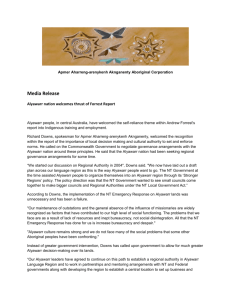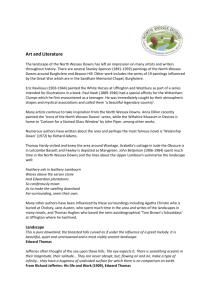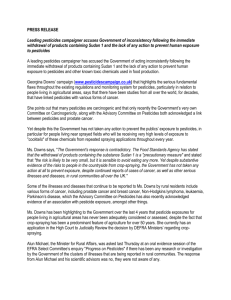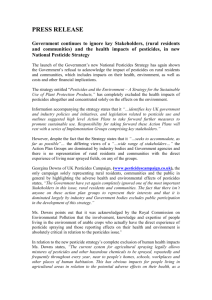PRESS RELEASE – 3rd August 2004
advertisement
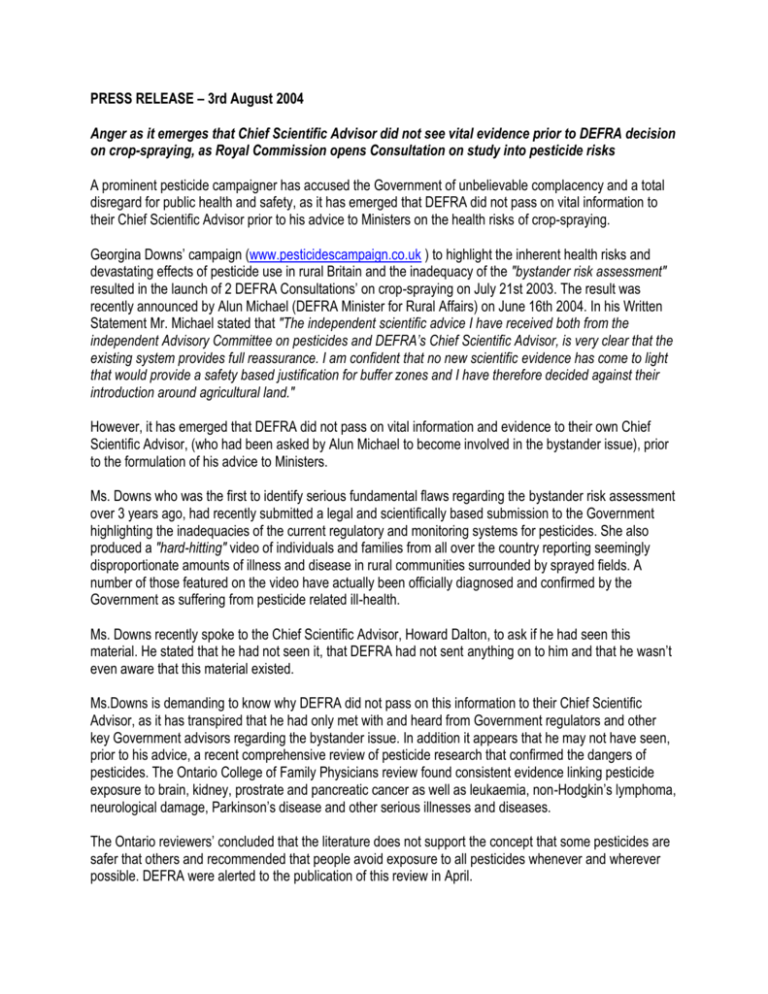
PRESS RELEASE – 3rd August 2004 Anger as it emerges that Chief Scientific Advisor did not see vital evidence prior to DEFRA decision on crop-spraying, as Royal Commission opens Consultation on study into pesticide risks A prominent pesticide campaigner has accused the Government of unbelievable complacency and a total disregard for public health and safety, as it has emerged that DEFRA did not pass on vital information to their Chief Scientific Advisor prior to his advice to Ministers on the health risks of crop-spraying. Georgina Downs’ campaign (www.pesticidescampaign.co.uk ) to highlight the inherent health risks and devastating effects of pesticide use in rural Britain and the inadequacy of the "bystander risk assessment" resulted in the launch of 2 DEFRA Consultations’ on crop-spraying on July 21st 2003. The result was recently announced by Alun Michael (DEFRA Minister for Rural Affairs) on June 16th 2004. In his Written Statement Mr. Michael stated that "The independent scientific advice I have received both from the independent Advisory Committee on pesticides and DEFRA’s Chief Scientific Advisor, is very clear that the existing system provides full reassurance. I am confident that no new scientific evidence has come to light that would provide a safety based justification for buffer zones and I have therefore decided against their introduction around agricultural land." However, it has emerged that DEFRA did not pass on vital information and evidence to their own Chief Scientific Advisor, (who had been asked by Alun Michael to become involved in the bystander issue), prior to the formulation of his advice to Ministers. Ms. Downs who was the first to identify serious fundamental flaws regarding the bystander risk assessment over 3 years ago, had recently submitted a legal and scientifically based submission to the Government highlighting the inadequacies of the current regulatory and monitoring systems for pesticides. She also produced a "hard-hitting" video of individuals and families from all over the country reporting seemingly disproportionate amounts of illness and disease in rural communities surrounded by sprayed fields. A number of those featured on the video have actually been officially diagnosed and confirmed by the Government as suffering from pesticide related ill-health. Ms. Downs recently spoke to the Chief Scientific Advisor, Howard Dalton, to ask if he had seen this material. He stated that he had not seen it, that DEFRA had not sent anything on to him and that he wasn’t even aware that this material existed. Ms.Downs is demanding to know why DEFRA did not pass on this information to their Chief Scientific Advisor, as it has transpired that he had only met with and heard from Government regulators and other key Government advisors regarding the bystander issue. In addition it appears that he may not have seen, prior to his advice, a recent comprehensive review of pesticide research that confirmed the dangers of pesticides. The Ontario College of Family Physicians review found consistent evidence linking pesticide exposure to brain, kidney, prostrate and pancreatic cancer as well as leukaemia, non-Hodgkin’s lymphoma, neurological damage, Parkinson’s disease and other serious illnesses and diseases. The Ontario reviewers’ concluded that the literature does not support the concept that some pesticides are safer that others and recommended that people avoid exposure to all pesticides whenever and wherever possible. DEFRA were alerted to the publication of this review in April. Ms. Downs states "The advice that the Chief Scientific Advisor gave to Ministers appears to have been formulated having only heard one side of the argument in relation to the whole bystander issue, which cannot possibly lead to a balanced or fully informed decision. He only heard from the very people that I have been challenging over the last 3 years, which is like asking a jury to reach a verdict having only heard one side of the case." Prior to this, Ms. Downs had already made a formal complaint to Alun Michael, in a letter dated 6/4/04, in relation to the approach adopted by the Advisory Committee on Pesticides regarding her submission and accompanying video. She explained that a number of members had not seen the material, instead relying on a short summary report prepared by the secretary of the Committee. Ms. Downs subsequently pointed out that the report contained serious factual inaccuracies and it was a completely unacceptable approach, as the ACP members should have seen this video evidence for themselves. Ms. Downs states "The Chairman of the ACP has repeatedly stated that the Committee needs to see the evidence of what is happening in reality to check if the current system is working. Yet when they receive the evidence to show that the current system is not working, (to the very people who are advising Ministers on a serious public health issue), it is not really looked at. This is unbelievably complacent and shows a total disregard for public health and safety." In view of this, Ms. Downs welcomes the terms of reference released today by the Royal Commission on Environmental Pollution regarding their special study examining the scientific evidence on which DEFRA has based its decision on bystander exposure. Ms.Downs says, "I welcome this review to examine the scientific basis behind DEFRA's decision and I hope that they will consider all the evidence very carefully. In particular I would like to see the Royal Commission take a thorough and independent look at the modelling that is currently used in relation to bystander exposure. The existing predictive model is not appropriate or realistic to address the long-term exposure of a resident living in an agricultural area, where they will be subjected to regular spraying applications, with mixtures of pesticides and other hazardous chemicals, for multiple years and in many cases for decades." Ms. Downs points out that there have not been any direct measurements in either the UK or the EU of the actual exposures that people are receiving in this type of exposure scenario. Nor has there been any direct measurements taken of pesticide levels in the blood and urine or any other health monitoring of rural residents. She says "It was stated at the ACP Open Meeting in 2002 that the members could not judge whether or not there is an unacceptable health risk for people living near sprayed fields until this data had been collected. Well to date it hasn’t and yet the Government announced that the current system is robust and provides adequate protection to the public. Considering these serious data gaps and the ill-health that continues to be reported in rural communities then I would like to know where is the scientific evidence to support their position?" Ms. Downs is hoping that the Royal Commission’s study will now look at all this in a fully independent manner. She urges all those who live near sprayed fields to make their voices heard by submitting to the Consultation and if possible, taking into account travel restrictions due to any ill-health, to make their presence known at the public meeting on September 25th in London. Ms. Downs states "In my opinion the Government grossly misled the public that the decision not to introduce no-spray zones was based on hard scientific fact and evidence. Whereas it is actually based on predictive exposure models that are wholly inappropriate for this type of exposure scenario and seemingly the opinion of a few select officials and scientific advisors. Some of whom, as it turns out, were apparently not provided with (or were not interested in reviewing) all the relevant information to make a balanced and fully informed decision anyway. This is a completely inappropriate and unacceptable way to reach policy decisions especially when there are serious implications for public health." Notes to Editors: The Royal Commission on Environmental Pollution have today issued the terms of reference for their special study that will examine the scientific evidence on which DEFRA has based its decision on bystander exposure and its policy on access to information about crop-spraying. The Royal Commission press release can be found at:- www.rcep.org.uk The "bystander risk assessment" is the official method of assessing the dangers and risks to public health from agricultural spraying, but is not representative of the long-term exposure of a resident living in an agricultural area. (See www.pesticidescampaign.co.uk for further information) There is currently no legal obligation for farmers to notify anyone of any intended spraying application or to supply information on the chemicals being used, regardless of whether adverse health effects have been suffered At the present time a crop-sprayer is legally allowed to repeatedly spray mixtures of poisonous chemicals right up to the open window of any occupied premises whether it be a resident’s home, a school (nursery, infant, primary etc.) a home for the elderly or disabled or any office or workplace Georgina Downs’ campaign resulted in the launch of 2 Consultations’ on crop-spraying on July 21st 2003. The first part was in relation to making it a legal obligation to notify people before any spraying application and to provide the information on the chemicals to be used. The second part was in relation to introducing mandatory no-spray zones around residential areas. This Consultation resulted in the highest number of responses since DEFRA records began Following this Consultation Alun Michael (Rural Affairs Minister) announced in a written statement on June 16th 2004 that he had decided to:- commission a new report by the Royal Commission on Environmental Pollution to assess the risk to people from crop-spraying; new legislation to make it mandatory for farmers and growers to keep spray records and to make those records available to the public via a "third party," and a pilot study to explore practical means of providing advance notification to residents living next to farms. The full Ministerial Statement can be found at:http://www.defra.gov.uk/news/2004/040616d.htm The recent comprehensive pesticides literature review by the Ontario College of Family Physicians that confirmed the dangers of pesticides can be found at: www.pesticidescampaign.co.uk Ms. Downs is currently pursuing legal options in view of challenging the Government following the recent decision that there is no scientific justification for the introduction of no-spray zones around residential areas. (See http://www.pesticidescampaign.co.uk/consultation.htm for further information) Georgina Downs campaigns to highlight the effects of pesticide use in rural Britain and has lived next to regularly sprayed fields for 20 years. She was the first to identify serious fundamental flaws regarding the bystander risk assessment over 3 years ago. As a result she met with Government Ministers (Lord Whitty, DEFRA Minister for Food and Farming and Michael Meacher, Former Minister for the Environment on December 17th 2002 and Alun Michael, Minister for Rural Affairs on December 17th 2003) to present her case for a change in the regulations and legislation governing agricultural spraying. She has also produced 2 videos "Pesticide Exposures for People in Agricultural Areas – Part 1 Pesticides in the Air; Part 2 The Hidden Costs" to illustrate chemical exposure and the effects on people living in rural areas. She has called for an immediate ban on crop-spraying and the use of pesticides near to people's homes, schools, workplaces and any other places of human habitation and for the introduction of a new legal obligation to warn people before spraying and to provide the necessary chemical information Ms Downs continues to receive emails and letters from people all over the country reporting clusters of acute and chronic long-term illnesses and diseases in communities surrounded by sprayed fields. The most common illnesses reported include clusters of various cancers, leukaemia, non-Hodgkins lymphoma, and neurological problems along with many other medical conditions and Ms. Downs points out that reports of this nature have gone on for decades Ms. Downs' campaign was featured on The Food Police BBC1 March 26th 2003; The Observer on April 13th 2003 ("Georgina's Fight Against Toxic Peril" and "Can We Have a Breath of Fresh Air?") Today programme BBC Radio 4 July 11th 2002; Farming Today BBC Radio 4 on March 25th, May 3rd, July 22nd 2003 and June 17th 2004; Sunday Telegraph on June 30th and July 28th 2002, March 23rd, May 5th, 31st August 2003 and June 20th 2004; BBC Breakfast News August 5th 2003 and June 16th 2004; You and Yours BBC Radio 4 on September 1st, November 6th and 12th 2003; That’s Esther ITV January 25th 2004; The Observer on May 2nd 2004; BBC 1 o’clock news on June 16th 2004; BBC News 24 on June 16th 2004; BBC Politics Show East on 11th July 2004 and in various other media Ms. Downs' campaign has been supported by Samuel Epstein, Professor Emeritus Environmental and Occupational Medicine, University of Illinois at Chicago School of Public Health and Chairman of the Cancer Prevention Coalition. He is the author of "Stop Cancer Before it Starts," and is known a leading international authority on cancer-causing effects of pesticides and other hazardous chemicals (see http://www.preventcancer.com/about/epstein.htm ); Michael Meacher MP, (Former DEFRA Minister for the Environment and one of the Minister’s Ms. Downs originally presented the case to); Norman Baker MP, the Liberal Democrat’s front bench environment spokesman; Caroline Lucas MEP and the Soil Association amongst others For further information in relation to Ms. Downs’ submission to the DEFRA Consultation and accompanying video, featuring people from all over the country reporting clusters of acute and chronic long-term illnesses and diseases in communities surrounded by sprayed fields or any other aspect of Ms. Downs’ campaign see www.pesticidescampaign.co.uk Contact: Georgina Downs Telephone: 01243 773846 – Mobile: 07906 898 915 – Email: georginadowns@yahoo.co.uk Campaign: "A Breath of Fresh Air?"
